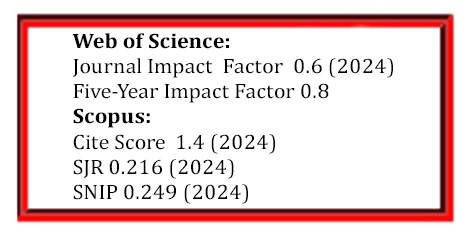Effect of Kaolin and Polyurethane on the Fracture and Thermal Properties of Epoxy Based Compositions
Keywords:
epoxy, polyurethane, kaolin, impact strength, fracture toughness, thermal propertiesAbstract
The present work investigates the mechanical and thermal properties of conventional and hybrid composites based on
epoxy resin modified with kaolin and polyurethane. Hybrid composites are expected to exhibit better properties than
heat resin due to positive deviation generated from the combination of two different toughening mechanisms. Diglicydyl
ether of bisphenol A (Araldite 260 GY) was used as a matrix and polyamine Aradure 460 as crosslinking agent.
Polyurethane was obtained with hydroxyl-terminated polyester Desmophen 1200 and toluene diisocyanate. The chain
extender used in this work was 1,4-Butanediol. The impact strength, the critical stress intensity factor (KC) and the
deflection temperature under load (DTUL) were evaluated as function of modifiers content. It was shown that the impact
strength of epoxy resin increased with polyurethane (PU) content significantly until it reached a maximum value of
5.8 kJ/m2 at 20 phr kaolin and 6.9 kJ/m2 with 20 phr of PU, which corresponds to respectively 150 % and more than
200 % improvement in comparison with IS of neat resin. The addition of 5 phr – 20 phr PU did not affect KC but this
latter decreased with 30 phr or 40 phr PU. However, KC was maximally increased by approximately 60 % with 20 phr
kaolin and 40 % with 20 phr PU. The thermal resistance of epoxy resin decreased by 40 % with the addition of 10 phr
PU, however the addition of both modifier, i.e. 15 phr kaolin and 10 phr PU leads to an increase of DTUL the level of
that of virgin epoxy resin.
Downloads
Published
Issue
Section
License
The copyrights for articles in this journal are retained by the author(s), with first publication rights granted to the journal. By virtue of their appearance in this open-access journal, articles are free to use with proper attribution in educational and other non-commercial settings.



